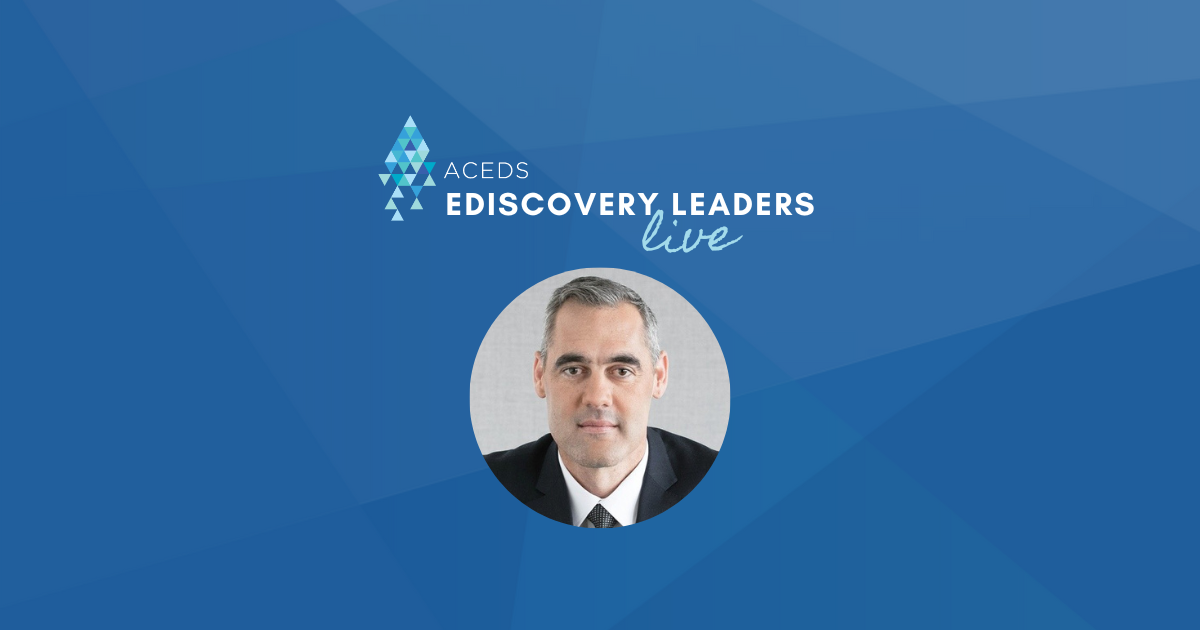eDiscovery Leaders Live: Grant Whiteley of KordaMentha
Grant Whiteley, a partner at KordaMentha, joins George Socha, Senior Vice President of Brand Awareness at Reveal, for ACEDS #eDiscoveryLeadersLive.
A forensics partner at KordaMentha, Grant leads the firm’s eDiscovery team and assists clients in responding to royal commissions, public inquiries, and regulatory notices. Grant specializes in dealing with assignments involving technology-based issues. Grant has over 14 years of investigative experience, including eight years with the WA Police where his deployments including being attached to the Computer Crime Squad and Internal Affairs Unit. After leaving law enforcement, Grant worked as part of the forensics and integrity team at a Big Four accounting firm, then joined KordaMentha.
Grant began the discussion talking about his role at KordaMentha and the geographical reach of his team, which took us to the challenges of a multinational practice in the APAC region. Grant shifted to TAR, something they adopted early, as well as sentiment analysis and AI models. He talked about early experiences, adoption rates in Australia and elsewhere, and the different uses cases for TAR 1 and TAR 2. Grant discussed what they do with sentiment analysis, some of the types of sentiment they search for, and the results they have achieved. He also discussed AI models, the benefits of layering them, the challenges of building their own AI models, and how clients benefit from their uses. Finally, Grant gave us a glimpse into what might be next at KordaMentha.
Key Highlights
- [3:18] Grant and his role at KordaMentha.
- [4:17] The geographical reach of his team.
- [4:42] The challenges of working across national and cultural borders.
- [5:40] An early adopter of TAR.
- [6:06] Using sentiment analysis and AI models.
- [6:38] Using AI models for non-discovery-related matters.
- [7:00] Early experiences with TAR – TAR 1.0.
- [8:08] TAR 2.0 / continuous active learning – earlier certainty, more richness understanding.
- [8:57] TAR 2 by default, TAR 1 as appropriate.
- [9:30] What they use for their biggest client.
- [10:33] A broad and deep appetite for TAR in Australia.
- [11:11] But less so on the international stage.
- [11:36] Why TAR adoption is farther along in Australia than in the US and UK.
- [13:00] Perhaps less gamesmanship in Australian litigation.
- [14:21] What they do with sentiment analysis.
- [15:18] How using sentiment analysis helped them find misconduct.
- [17:18] Types of sentiment they searched for – alternating sentiment and highly negative sentiment.
- [18:05] The benefits of layering reusable AI models, initially in insolvency matters.
- [20:00] How they layer models and what they use them to look for.
- [21:35] How they build AI models themselves, without having their own data science team to rely on.
- [22:41] An opportunity to use AI/ML outside traditional discovery.
- [23:22] How clients benefit from the use of AI models.
- [25:02] Using AI models to find more like this, and to find something I don’t know.
- [27:00] Tying the use of AI models back to traditional eDiscovery.
- [28:44] Next steps.
Key Quotes
-
- “[Using AI models] is probably the area where we see a lot of opportunity and we’re trying to be out front of the pack. We were probably an early adopter of TAR when it first emerged. We’re proponents of pushing that for our clients in Australia.”
- “Now with TAR 2 and continuous active learning, we’ve built a lot more robust management practices into our workflow. We can now report on that and we see a lot more certainly, at least in the initial [steps] and partway through the project so we know we are on the right track before we spend a lot of time investing in doing reviewing without really knowing where we are going to land.”
- “Our default position is to always deploy TAR 2 but we do see that there is a use case, not as frequently, but there are use cases for TAR 1 depending on what the objective of the scenario is.”
- “I’ve been surprised. In Australia the uptake on TAR has been good, it’s been really well received. There’s no question when we have a project and we talk about using TAR, everyone’s keen to use it on their project. The see the benefits of it. They recognize the value that it adds.”
- “I think in Australia, at least with the clients we work with and the matters I’m involved in, there really is a desire for the most efficient process possible and that generally is for both parties involved in the dispute.”
- “We’ve found that using sentiment analysis can help us in various use cases that we traditionally wouldn’t have surfaced those types of documents before.”
- “The fact that the layering [AI models] can identify groups of documents so quickly has really been able to be a point of differentiation that our insolvency colleagues can use when they’re trying to win work themselves and differentiate us from our competitors.”
- “AI and machine learning is where we see the future.”
